Log in
Search
Latest topics
» TEE DEE Having issuesby TD ABUSER Today at 9:43 pm
» Landing-gear tips
by roddie Today at 6:17 pm
» Roger Harris revisited
by TD ABUSER Today at 2:13 pm
» Tee Dee .020 combat model
by Ken Cook Today at 1:41 pm
» Retail price mark-up.. how much is enough?
by Ken Cook Today at 1:37 pm
» Happy 77th birthday Andrew!
by getback Today at 11:52 am
» My latest doodle...
by roddie Today at 10:43 am
» My N-1R build log
by GallopingGhostler Yesterday at 3:04 pm
» Chocolate chip cookie dough.........
by roddie Yesterday at 1:13 pm
» Purchased the last of any bult engines from Ken Enya
by sosam117 Yesterday at 11:32 am
» Free Flight Radio Assist
by rdw777 Yesterday at 9:24 am
» Funny what you find when you go looking
by rsv1cox Wed Nov 20, 2024 3:21 pm
Cox Engine of The Month
What is the most oil and nitro resistant covering?
Page 1 of 2
Page 1 of 2 • 1, 2 
 What is the most oil and nitro resistant covering?
What is the most oil and nitro resistant covering?
I know there are loads of people who seem to be able to put a model together just about every week it seems but I'm one of those for whom the process takes a year or more especially when scratch built. To that end I want my models to last a long time but I also want to fly with Cox engines and the associated mess of oil and sometimes spilled raw fuel containing high levels of nitromethane both of which are known to eventually destroy airframes and covering.
I know this topic has been touched on a lot on this forum already but here I go asking again ...
Since you guys predominantly fly Cox engines I thought I'd ask you what coverings are most resistant long term. I've done a little bit of research by reading build articles from the 1/2a craze in the 1970s. Most of them use monokote or solarfilm with occassional mention of epoxy based finishes. I'd imagine a fully cured epoxy finish to be one of the best especially around the engine compartment whereas the plastic films, I imagine, would tend to lift along seam lines quite soon after getting covered in oil and nitromethane.
What are you using?
I know this topic has been touched on a lot on this forum already but here I go asking again ...
Since you guys predominantly fly Cox engines I thought I'd ask you what coverings are most resistant long term. I've done a little bit of research by reading build articles from the 1/2a craze in the 1970s. Most of them use monokote or solarfilm with occassional mention of epoxy based finishes. I'd imagine a fully cured epoxy finish to be one of the best especially around the engine compartment whereas the plastic films, I imagine, would tend to lift along seam lines quite soon after getting covered in oil and nitromethane.
What are you using?
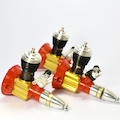
halfpilot- Formerly known as:
ThermalSniffer
- Posts : 96
Join date : 2011-09-06
Location : England
 Re: What is the most oil and nitro resistant covering?
Re: What is the most oil and nitro resistant covering?
I've used Ultracote on two 1/2A planes back in 2011. The first was a Li'l Jumpin Bean that only lasted a couple of years before wearing down to a nub, then being redesigned and resurrected. The other from the same roll of film was my Li'l Satan which I still fly several times a year, often waiting a week to be thoroughly cleaned. The only film that lifted so far on it was the open-ended patch I ironed over the pushrod exit, and it was getting loose after a year so I pulled it off. That was when I was giving it a makeover for the Traveling Tee Dee engine. I have always epoxied the engine area, lately switching to polyurethane for weight savings, smoother application, and so far equal fuel resistance.
Ever since those two builds I have used Monokote on my wings. This is how I do it with no sock or heat gun. With Monokote the glue temp and shrink temp overlap so you just have to get the feel of it, and every roll and color are different. When you get to shrinking temp, you'll see a color change as you pass over an area. Usually, it'll darken as it shrinks, but will return to normal when cooled off.
The seams are critical. I apply it to the bottom panel first, wrapping it around to cover the whole LE and TE, ironing it securely along its length, and then trim it short of touching the tops of the ribs, and also the same way on the TE. Then I cover the top wing panel, overlapping a half to an inch to the underside depending on the size of the plane. Now all the seams are on the bottom of your wing.
Next, I use the iron to make sure it's completely glued down to the entire LE for its whole length. If the wing has fixed flaps, iron it securely to that wood on all sides before shrinking the TE sheeting and rib bays. If you wait till after you've shrunk the rib bays, you'll have trouble getting it to stay adhered to the fixed flaps because it's already too tight.
Now I use an iron to stick the adhesive firmly to the center sheeting all the way around. Any bubbles from gas trapped underneath can be fixed later, but wait until last to do that. Once your center section is ironed securely, turn the heat up and start gradually shrinking the rib bays one at a time. Do it over and under all the way from center to tip, top and bottom, trying not to glue it to the ribs and spars, though it can't be avoided, save that for last. Once all of your bays are shrunk, cook out any stubborn wrinkles, and run the iron over the ribs and spars.
Using a new exacto blade pop the point through ant bubbles over solid wood and shrink and stick them down with the iron. Now when you apply the fillets to the wing roots, make sure the fillet overlaps the Monokote for at least 1/16".
I gotta go now, I can come recheck what I wrote and answer any questions later.
Rusty
Ever since those two builds I have used Monokote on my wings. This is how I do it with no sock or heat gun. With Monokote the glue temp and shrink temp overlap so you just have to get the feel of it, and every roll and color are different. When you get to shrinking temp, you'll see a color change as you pass over an area. Usually, it'll darken as it shrinks, but will return to normal when cooled off.
The seams are critical. I apply it to the bottom panel first, wrapping it around to cover the whole LE and TE, ironing it securely along its length, and then trim it short of touching the tops of the ribs, and also the same way on the TE. Then I cover the top wing panel, overlapping a half to an inch to the underside depending on the size of the plane. Now all the seams are on the bottom of your wing.
Next, I use the iron to make sure it's completely glued down to the entire LE for its whole length. If the wing has fixed flaps, iron it securely to that wood on all sides before shrinking the TE sheeting and rib bays. If you wait till after you've shrunk the rib bays, you'll have trouble getting it to stay adhered to the fixed flaps because it's already too tight.
Now I use an iron to stick the adhesive firmly to the center sheeting all the way around. Any bubbles from gas trapped underneath can be fixed later, but wait until last to do that. Once your center section is ironed securely, turn the heat up and start gradually shrinking the rib bays one at a time. Do it over and under all the way from center to tip, top and bottom, trying not to glue it to the ribs and spars, though it can't be avoided, save that for last. Once all of your bays are shrunk, cook out any stubborn wrinkles, and run the iron over the ribs and spars.
Using a new exacto blade pop the point through ant bubbles over solid wood and shrink and stick them down with the iron. Now when you apply the fillets to the wing roots, make sure the fillet overlaps the Monokote for at least 1/16".
I gotta go now, I can come recheck what I wrote and answer any questions later.
Rusty
_________________
Don't Panic!
...and never Ever think about how good you are at something...
while you're doing it!
My Hot Rock & Blues Playlist
...and never Ever think about how good you are at something...
while you're doing it!
My Hot Rock & Blues Playlist

RknRusty- Rest In Peace

- Posts : 10869
Join date : 2011-08-10
Age : 68
Location : South Carolina, USA
 Re: What is the most oil and nitro resistant covering?
Re: What is the most oil and nitro resistant covering?
ThermalSniffer wrote:Since you guys predominantly fly Cox engines I thought I'd ask you what coverings are most resistant long term.
Problem isn't using the plastic film. I've used Monokote and various other films (Hobby Shack low temp, Solarfilm, Coverite, now Chinese film, etc.) Shouldn't have a problem as long as clean-up is done after flying. It could weaken the heat glue around edges, but some spray cleaner to mop up the sop after flight would prevent that. Most problems are related to decals and trim. Electric flight doesn't require fuel proofing, so some decals with electrics in mind may not be fuel stable, ditto for paints. YMMV (Your Mileage May Vary)

GallopingGhostler- Top Poster


Posts : 5724
Join date : 2013-07-13
Age : 70
Location : Clovis NM or NFL KC Chiefs
 Re: What is the most oil and nitro resistant covering?
Re: What is the most oil and nitro resistant covering?
I meant to say more clearly, the location of the overlaps and seams is the most critical part for not having it lift. ARFs are famous for the seams being cenrtered right on the LE and TE edges. That's the dumbest place you could think of, and it's why I overlap my covering jobs in such a wide strip underneath the wing. On ARFs I use clear packing tape and scotch tape along those areas to secure it.
If you want to learn how to Monokote a fuselage, Dane Martin is the best expert I know on that subject. He made a superb tutorial either here or on Stunthanger.com. His profile statistics where you can look through his topics on CEF is:
https://www.coxengineforum.com/u1994stats
On SH: http://stunthanger.com/smf/profile/?u=26063
I PMd him so he'd see this thread.
Rusty
If you want to learn how to Monokote a fuselage, Dane Martin is the best expert I know on that subject. He made a superb tutorial either here or on Stunthanger.com. His profile statistics where you can look through his topics on CEF is:
https://www.coxengineforum.com/u1994stats
On SH: http://stunthanger.com/smf/profile/?u=26063
I PMd him so he'd see this thread.
Rusty
_________________
Don't Panic!
...and never Ever think about how good you are at something...
while you're doing it!
My Hot Rock & Blues Playlist
...and never Ever think about how good you are at something...
while you're doing it!
My Hot Rock & Blues Playlist

RknRusty- Rest In Peace

- Posts : 10869
Join date : 2011-08-10
Age : 68
Location : South Carolina, USA
 Re: What is the most oil and nitro resistant covering?
Re: What is the most oil and nitro resistant covering?
Thanks guys, I should say I have covered numerous models with heat shrink film as well as tissue and dope covering but have never run an oily glow powerplant and it is on this point that I'm keen to focus.

halfpilot- Formerly known as:
ThermalSniffer
- Posts : 96
Join date : 2011-09-06
Location : England
 Monokote
Monokote
Wow, quite the intro there Mr Rusty. Let me dig up my you tube links for the tutorial

Dane Martin- Silver Member

- Posts : 76
Join date : 2016-02-11
Age : 42
Location : Las Vegas, NV
 Re: What is the most oil and nitro resistant covering?
Re: What is the most oil and nitro resistant covering?
You mentioned it in your text. In my opinion a two part epoxy paint withstands nitro and cleans up better than any other finish. It's downsides are, it's fussy to mix, stinks, and can't be stored once mixed. But wow, does it hold up.
The model in the fore ground is a scratch built that I did over 40 years ago with many many flights and more than a few nose-overs. It's got some flaws but the paint could pass for a yesterday application. Wing is monocote.
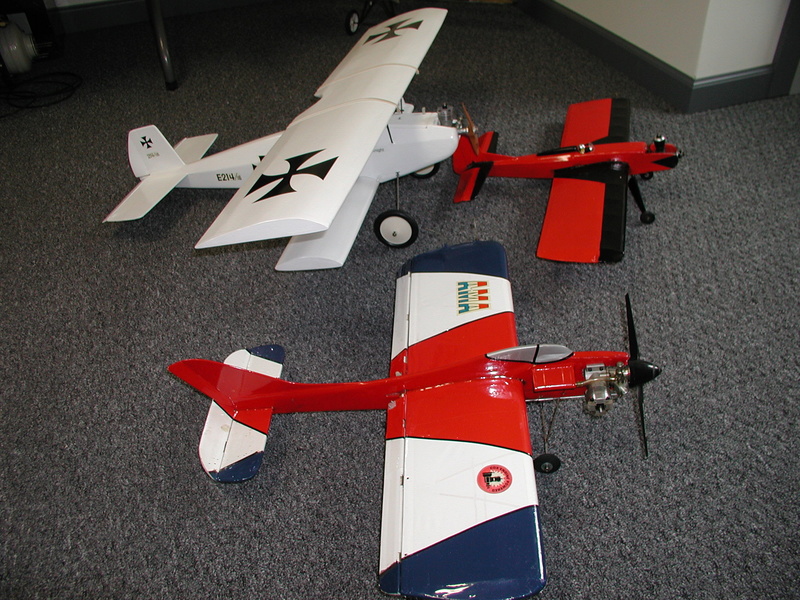
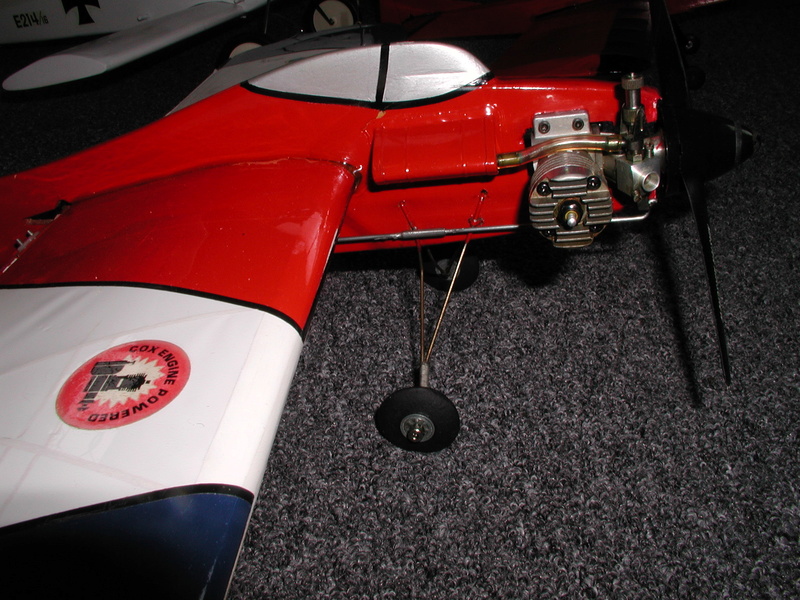
But my new best friend is Top Flite's Lustrekote which I used on the other two models. No mixing, economical, easy to apply and stands up well if your not looking for a show finish. Sanding sealer pre-coat is a must followed by primer and several coats of finish.
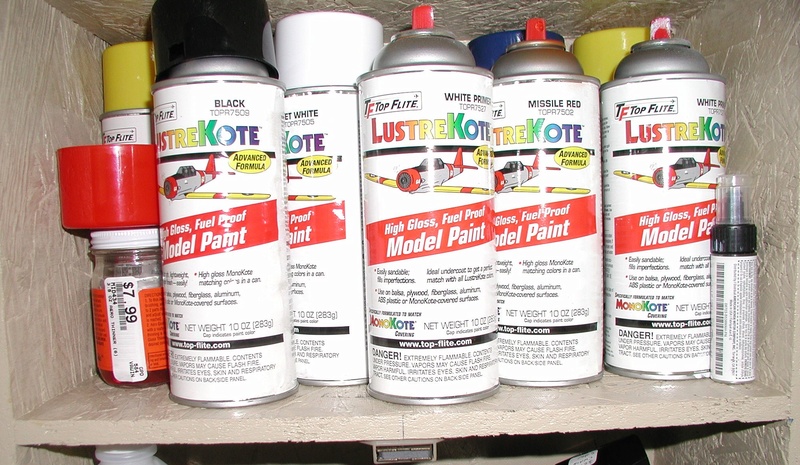
The model in the fore ground is a scratch built that I did over 40 years ago with many many flights and more than a few nose-overs. It's got some flaws but the paint could pass for a yesterday application. Wing is monocote.


But my new best friend is Top Flite's Lustrekote which I used on the other two models. No mixing, economical, easy to apply and stands up well if your not looking for a show finish. Sanding sealer pre-coat is a must followed by primer and several coats of finish.


rsv1cox- Top Poster




Posts : 11250
Join date : 2014-08-18
Location : West Virginia
 Re: What is the most oil and nitro resistant covering?
Re: What is the most oil and nitro resistant covering?
Monocote and Ultracote are generally unavailable in the UK.
Be careful when specifying Solarfilm. Solarfilm is one of many products made by the company Solarfilm. It is not only not fuel proof - it is not fuel resistant and lacks strength for most control line models - especially the older kits that rely on the covering for strength.
Solarfilm produce Supershrink and Superkote which are very fuel resistant and strong coverings.
http://www.solarfilm.co.uk/default.aspx
It also helps if you apply Solarfilm Clearcote to the wood before applying the covering as it improves adhesion and increases fuel resistance at seams and overlaps.
Be careful when specifying Solarfilm. Solarfilm is one of many products made by the company Solarfilm. It is not only not fuel proof - it is not fuel resistant and lacks strength for most control line models - especially the older kits that rely on the covering for strength.
Solarfilm produce Supershrink and Superkote which are very fuel resistant and strong coverings.
http://www.solarfilm.co.uk/default.aspx
It also helps if you apply Solarfilm Clearcote to the wood before applying the covering as it improves adhesion and increases fuel resistance at seams and overlaps.

ian1954- Diamond Member

- Posts : 2688
Join date : 2011-11-16
Age : 70
Location : England
 Re: What is the most oil and nitro resistant covering?
Re: What is the most oil and nitro resistant covering?
Thanks Ian, yes, being in the UK will bring certain limitations regarding product availability. However ultracote is available here as profilm or oracover, not the full range but, having checked every single colour in my 2015 samples book bought from oracover germany against those brought in by the UK distributor, I can assure you we get the vast majority of colours. Any that aren't brought in by jperkins or ripmax can be got from Europe at reasonable rates for now.
That said, all my film covering experience thus far has been with solarfilm brand products - solite and solarfilm. Yes, as you intimate, it is confusing since one of the products shares the name of the brand. I will have to get myself some clearcoat and test it out.
On the other hand I am one of those that is always chasing better so the epoxy finishes really appeal to me. Might not be suitable though since I haven't got a dedicated workspace and would need to spray them in the garden.
That said, all my film covering experience thus far has been with solarfilm brand products - solite and solarfilm. Yes, as you intimate, it is confusing since one of the products shares the name of the brand. I will have to get myself some clearcoat and test it out.
On the other hand I am one of those that is always chasing better so the epoxy finishes really appeal to me. Might not be suitable though since I haven't got a dedicated workspace and would need to spray them in the garden.

halfpilot- Formerly known as:
ThermalSniffer
- Posts : 96
Join date : 2011-09-06
Location : England
 Re: What is the most oil and nitro resistant covering?
Re: What is the most oil and nitro resistant covering?
ian1954 wrote:Be careful when specifying Solarfilm. Solarfilm is one of many products made by the company Solarfilm. It is not only not fuel proof - it is not fuel resistant and lacks strength for most control line models - especially the older kits that rely on the covering for strength. Solarfilm produce Supershrink and Superkote which are very fuel resistant and strong coverings.
http://www.solarfilm.co.uk/default.aspx
Interesting, thanks, Ian. Last time I used Solarfilm was 30 years ago. Then, it was all fuel-proof. I guess with the influx of electrics, they made changes to reduce costs.
It also helps if you apply Solarfilm Clearcote to the wood before applying the covering as it improves adhesion and increases fuel resistance at seams and overlaps.
I use Coverite Balsarite, and in past used Sig Stix-It some time ago. I imagine that Clearcote must be a similar product.
A little off-topic, but in today's discussion with a friend, balsa prices have skyrocketed. I think we'll be seeing more and more alternative materials and building methods.
Rusty, you've got some good points there. I never really paid much attention to how I seamed, but made sure there was more than enough overlap with plenty of heat to seal, so overall haven't had too much a problem except for some of there earlier really cheap coverings. Use of Balsarite on bare wood near seams helps to prevent pinhole bleed areas where fuel gets an opportunity to soak wood through a poor heat sealing bond.
Oh, and regarding Monokote, I used to remember it was easy to use around seams. Lately stuff I used seems to lack the good properties it once had. Above all things, I found the Hobby King "China-kote" to be easier to apply and seems to hold it's taughtness longer. Only thing is its heat glue backing layer doesn't match the film color, so I'm careful in how I trim. Else, you end up with a fine white line. Haven't used it enough yet to see how it endures extended glow use.

GallopingGhostler- Top Poster


Posts : 5724
Join date : 2013-07-13
Age : 70
Location : Clovis NM or NFL KC Chiefs
 Re: What is the most oil and nitro resistant covering?
Re: What is the most oil and nitro resistant covering?
See if this works here....
https://youtu.be/VXWL9-bMWXI
I have found that with a little different methodology of application, fuel proofing the fuse is pretty easy with iron on. In your case, oracover is excellent.
https://youtu.be/VXWL9-bMWXI
I have found that with a little different methodology of application, fuel proofing the fuse is pretty easy with iron on. In your case, oracover is excellent.

Dane Martin- Silver Member

- Posts : 76
Join date : 2016-02-11
Age : 42
Location : Las Vegas, NV
 Re: What is the most oil and nitro resistant covering?
Re: What is the most oil and nitro resistant covering?
https://youtu.be/s4Lw3X82m2c

Dane Martin- Silver Member

- Posts : 76
Join date : 2016-02-11
Age : 42
Location : Las Vegas, NV
 Re: What is the most oil and nitro resistant covering?
Re: What is the most oil and nitro resistant covering?
https://youtu.be/9dOM8PAEpFI

Dane Martin- Silver Member

- Posts : 76
Join date : 2016-02-11
Age : 42
Location : Las Vegas, NV
 Re: What is the most oil and nitro resistant covering?
Re: What is the most oil and nitro resistant covering?
Interesting, Dane, in the video you mentioned using Econokote, which is different from Monokote. If it is still the same, was a relatively easy to use covering that shrunk really well. Got a crash damaged Great Planes Big Stick .60 given to me from a club member getting out of RC. I repaired it using HK "Chinakote". The ARF job still has wrinkles in the OEM Monokote finish, could not iron them out. I've used the later Monokote stuff, seems properties changed and not the same as the older stuff.
Patched areas with Chinacoat Bright Red (fuselage front and portion of tail, wing tip) is slightly lighter than Monokote Scarlet Red.
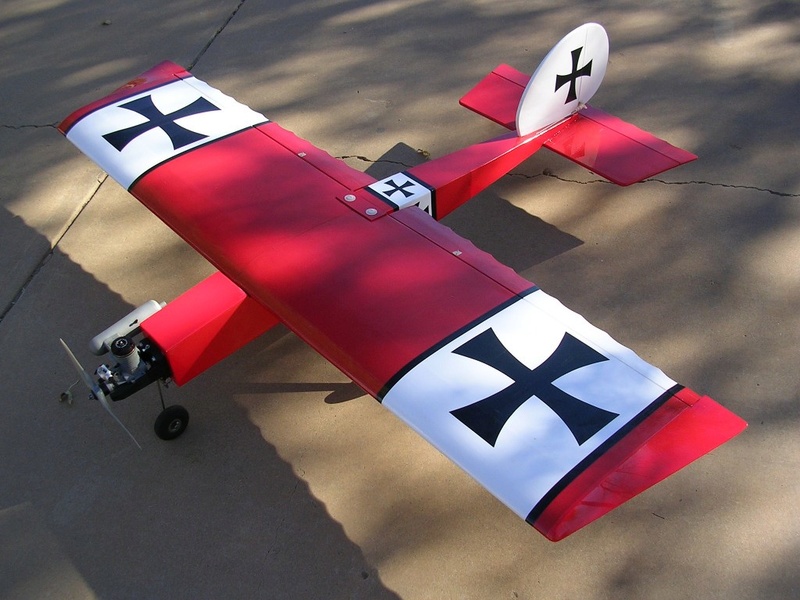
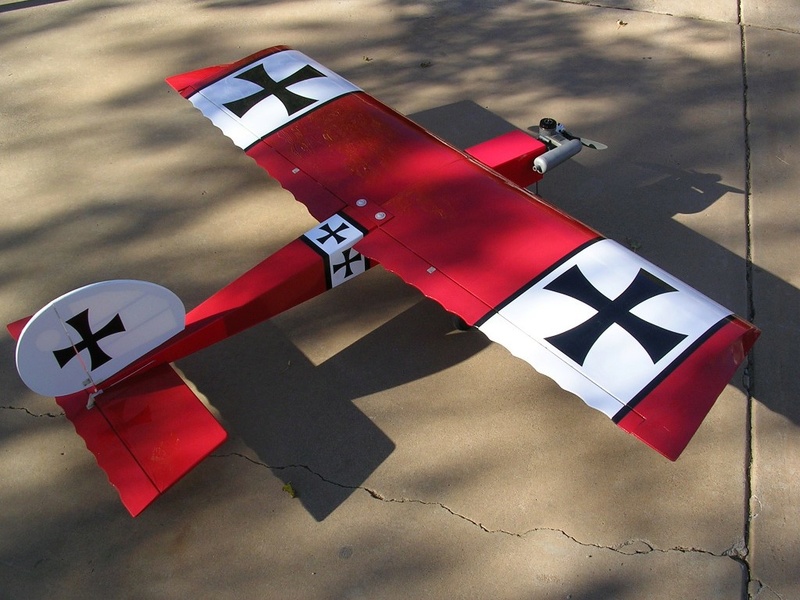
Wing tip up close, Chinakote covered around compound curve very well. Even with the summer heat in the garage and colder winter temps, it hasn't sagged.
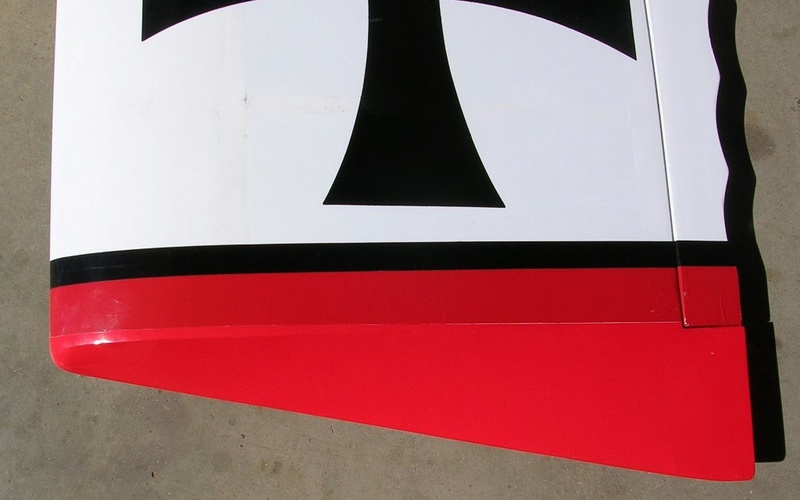
Best covering that provided also rigidity similar to doped silk was Coverite Micafilm, used a brush on heat sensitive glue Balsarite or Sig Stiks-It. That was the best covering I ever used, really loved it. Alas, it is no longer manufactured, down to my last roll of it, did a great job on my Ringmaster. It also stands up well to rough field shrubbery.
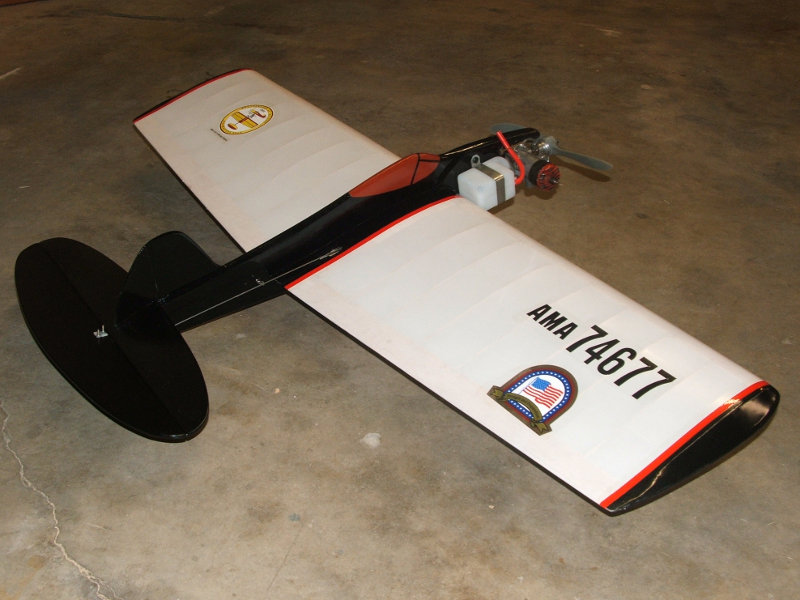
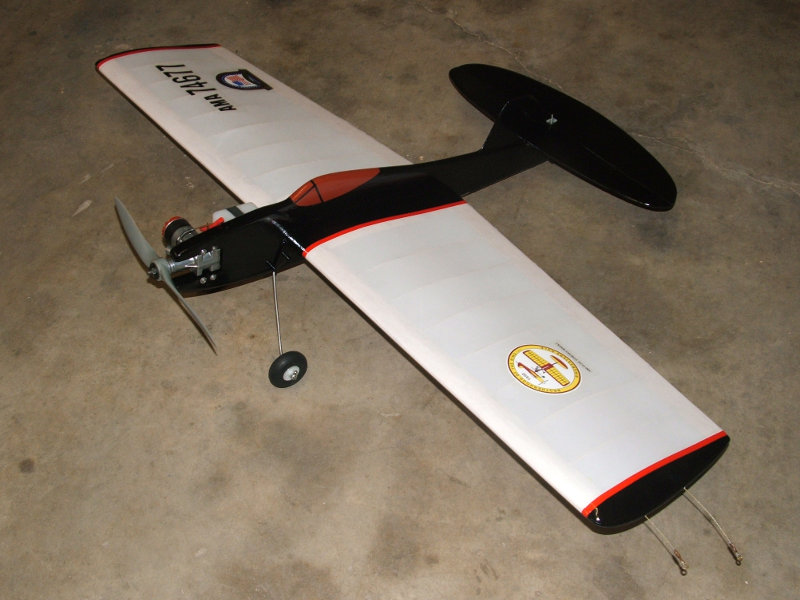
Patched areas with Chinacoat Bright Red (fuselage front and portion of tail, wing tip) is slightly lighter than Monokote Scarlet Red.


Wing tip up close, Chinakote covered around compound curve very well. Even with the summer heat in the garage and colder winter temps, it hasn't sagged.

Best covering that provided also rigidity similar to doped silk was Coverite Micafilm, used a brush on heat sensitive glue Balsarite or Sig Stiks-It. That was the best covering I ever used, really loved it. Alas, it is no longer manufactured, down to my last roll of it, did a great job on my Ringmaster. It also stands up well to rough field shrubbery.



GallopingGhostler- Top Poster


Posts : 5724
Join date : 2013-07-13
Age : 70
Location : Clovis NM or NFL KC Chiefs
 Re: What is the most oil and nitro resistant covering?
Re: What is the most oil and nitro resistant covering?
rsv1cox wrote:But my new best friend is Top Flite's Lustrekote which I used on the other two models. No mixing, economical, easy to apply and stands up well if your not looking for a show finish. Sanding sealer pre-coat is a must followed by primer and several coats of finish.
Looks good, Bob. I bought a couple cans of Rust-O-Leum spray color. Next job I do will be in this paint with Polycrylic as the base. Others in the Ringmaster Brotherhood have expressed this does a really nice job, plus its fuel proof once it cures.

GallopingGhostler- Top Poster


Posts : 5724
Join date : 2013-07-13
Age : 70
Location : Clovis NM or NFL KC Chiefs
 Fuel proof fuse
Fuel proof fuse
Let's see if I can remember how to post pics. My twister is monokote covered. Like George said, that particular video is econokote. To me they feel the same during application, you just have to be aware of the wildly different temp settings.... lol.
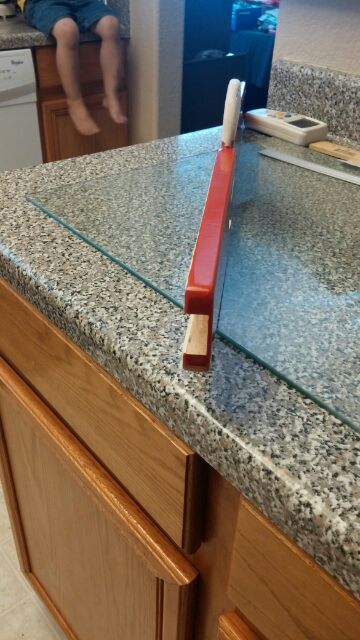
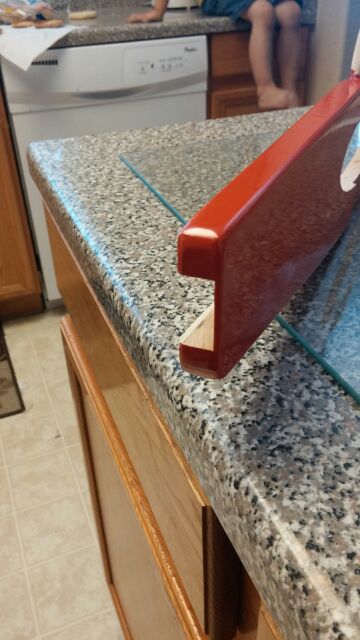 [/url
[/url
[url=https://servimg.com/view/19418177/20]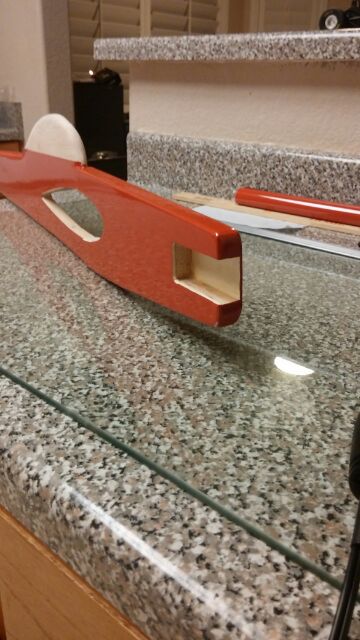

 [/url
[/url[url=https://servimg.com/view/19418177/20]


Dane Martin- Silver Member

- Posts : 76
Join date : 2016-02-11
Age : 42
Location : Las Vegas, NV
 Re: What is the most oil and nitro resistant covering?
Re: What is the most oil and nitro resistant covering?
If you want to use a fuel proof paint then, as mentioned on this forum, Klass Kote is now available in the UK.
http://www.fighteraces.co.uk/product/klasskote/
Not cheap but quite a few Scalers and RCers use it. It is quite a heavy finish though.
Just one look at the photograph of Dale's Twister fuselage and I need to watch the videos. I am OK covering ribby wings but I make a complete b.......s of fuselages. Even with electric that I need no fuel proofing for, I get peeling and find it difficult to disguise seams, cover tight corners and avoid bubbles.
http://www.fighteraces.co.uk/product/klasskote/
Not cheap but quite a few Scalers and RCers use it. It is quite a heavy finish though.
Just one look at the photograph of Dale's Twister fuselage and I need to watch the videos. I am OK covering ribby wings but I make a complete b.......s of fuselages. Even with electric that I need no fuel proofing for, I get peeling and find it difficult to disguise seams, cover tight corners and avoid bubbles.

ian1954- Diamond Member

- Posts : 2688
Join date : 2011-11-16
Age : 70
Location : England
 Re: What is the most oil and nitro resistant covering?
Re: What is the most oil and nitro resistant covering?
Thanks Ian. Here's the build thread of the twister.
http://stunthanger.com/smf/paint-and-finishing/twister-monokote-job/
http://stunthanger.com/smf/paint-and-finishing/twister-monokote-job/

Dane Martin- Silver Member

- Posts : 76
Join date : 2016-02-11
Age : 42
Location : Las Vegas, NV
 Re: What is the most oil and nitro resistant covering?
Re: What is the most oil and nitro resistant covering?
There are some many alternatives for fuel resistant coatings and very few for true fuel proof coatings
Intimated above by a few, is the notion to clean the model soon (after flight) and that is my preferred preventative as well as, where possible, using a muffler...I don't much care about the noise reduction... but they do route the residue away and make clean up less messy
I also take care to have fuel tank over flow away from the model and I try Never to drip raw fuel on it...
Car, boat, and aero modeling in Europe has a longer history (not a lot) than over here in the "colonies"
I know USA has many more mail order Big Box catalog soures (350+ million population) than our European fore founders do--- but I still believe Most of the usable solutions are available east of NY city and West of Moscow
Excuse me a sec while I crank up Rare Earth Get Ready drum solo and take a sip of my Jack n Coke
OK where was I...OH yes
Perfectly fuel proof and Light weight seem to be mutually exclusive so we must make trades...
I take a systems approach to this...
A: Need to ensure my hard work lasts despite my inability to perfectly fly a toy airplane
.....1. Build it strong
......2. Try to keep it light (they fly better this way)
.......3. Pre plan the obvious fuel or water incursions and deal with those areas during the build
Note: on a control line model the engine mounting, Landing gear, fuel tank attachment areas, and the controls coming OUT of the wing are basic entry points to get fuel near raw wood or glue joints
As I build I deliberatly use epoxy and Fibre glass( or Carbon fibre veil) in the nose, engine, and landing gear, wing attachment/ wing center section areas
These are generally the places where vibration and loose harware can "leak" raw or spent fuel into the wood
Modelers have built anf finishes models so many dacades ago before any of these modern products and some of them have still flying models that are older than I am
I tend to believe it is a good thing to keep fuel OUT of the innerds...and do NOT spew RAW fuel on your masterpiece...and do cclean it as soon as practicle
Intimated above by a few, is the notion to clean the model soon (after flight) and that is my preferred preventative as well as, where possible, using a muffler...I don't much care about the noise reduction... but they do route the residue away and make clean up less messy
I also take care to have fuel tank over flow away from the model and I try Never to drip raw fuel on it...
Car, boat, and aero modeling in Europe has a longer history (not a lot) than over here in the "colonies"
I know USA has many more mail order Big Box catalog soures (350+ million population) than our European fore founders do--- but I still believe Most of the usable solutions are available east of NY city and West of Moscow
Excuse me a sec while I crank up Rare Earth Get Ready drum solo and take a sip of my Jack n Coke
OK where was I...OH yes
Perfectly fuel proof and Light weight seem to be mutually exclusive so we must make trades...
I take a systems approach to this...
A: Need to ensure my hard work lasts despite my inability to perfectly fly a toy airplane
.....1. Build it strong
......2. Try to keep it light (they fly better this way)
.......3. Pre plan the obvious fuel or water incursions and deal with those areas during the build
Note: on a control line model the engine mounting, Landing gear, fuel tank attachment areas, and the controls coming OUT of the wing are basic entry points to get fuel near raw wood or glue joints
As I build I deliberatly use epoxy and Fibre glass( or Carbon fibre veil) in the nose, engine, and landing gear, wing attachment/ wing center section areas
These are generally the places where vibration and loose harware can "leak" raw or spent fuel into the wood
Modelers have built anf finishes models so many dacades ago before any of these modern products and some of them have still flying models that are older than I am
I tend to believe it is a good thing to keep fuel OUT of the innerds...and do NOT spew RAW fuel on your masterpiece...and do cclean it as soon as practicle
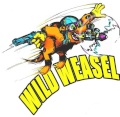
fredvon4- Top Poster


Posts : 4012
Join date : 2011-08-26
Age : 69
Location : Lampasas Texas
 Re: What is the most oil and nitro resistant covering?
Re: What is the most oil and nitro resistant covering?
Sensible advice Fred! Prevention, prevention, prevention. Seems to be the trend in this thread rather than any one magic bullet with the possible exception of epoxy based paint but as has been said they're heavy.
Very impressed with that covering job Dane. I haven't had a chance to watch the vids yet but will do soon.
Very impressed with that covering job Dane. I haven't had a chance to watch the vids yet but will do soon.

halfpilot- Formerly known as:
ThermalSniffer
- Posts : 96
Join date : 2011-09-06
Location : England
 Re: What is the most oil and nitro resistant covering?
Re: What is the most oil and nitro resistant covering?
my two cents...
-plastic covering is way better than any dope finish for keeping oil out, but there's a place for everything.
-If you use dope, get the oil off ASAP.
-Don't use econokote or similar light weight coverings on a profile fuselage, the stuff will not keep oil out around the engine area, its thinner plastic and glue is not as thick.
-Make sure if you do a combo, paint fuselage/ monokote wings, make sure there's significant overlap of edge.
-plastic covering is way better than any dope finish for keeping oil out, but there's a place for everything.
-If you use dope, get the oil off ASAP.
-Don't use econokote or similar light weight coverings on a profile fuselage, the stuff will not keep oil out around the engine area, its thinner plastic and glue is not as thick.
-Make sure if you do a combo, paint fuselage/ monokote wings, make sure there's significant overlap of edge.
 Re: What is the most oil and nitro resistant covering?
Re: What is the most oil and nitro resistant covering?
Hey Fred, just what is your blending ratio on that Jack and Coke? 


Marleysky- Top Poster


Posts : 3618
Join date : 2014-09-28
Age : 72
Location : Grand Rapids, MI
 Re: What is the most oil and nitro resistant covering?
Re: What is the most oil and nitro resistant covering?
Speaking of fuel and oil protection, I just shot the last wet coat of clear dope on my Twister. Except for the nose, where it has a layer under and one layer over the Tazmanian devil. I will spray it with clear Lustrekote later tonight. The content labels on both products read very similarly.
I sure I wish I could have ken Cook looking over my shoulder saying, "STOP Rusty, that's too much." Spray, darnit, that ain't enough.
Rusty
I sure I wish I could have ken Cook looking over my shoulder saying, "STOP Rusty, that's too much." Spray, darnit, that ain't enough.
Rusty
_________________
Don't Panic!
...and never Ever think about how good you are at something...
while you're doing it!
My Hot Rock & Blues Playlist
...and never Ever think about how good you are at something...
while you're doing it!
My Hot Rock & Blues Playlist

RknRusty- Rest In Peace

- Posts : 10869
Join date : 2011-08-10
Age : 68
Location : South Carolina, USA
 Re: What is the most oil and nitro resistant covering?
Re: What is the most oil and nitro resistant covering?
Marleysky wrote:Hey Fred, just what is your blending ratio on that Jack and Coke?
I think that the Jack kicked in during Fred's last three paragraphs. His usually faultless script took a bit of a beating there-abouts.
I love to read your posts Fred, always well thought out and nicely presented happy hour or not.
Bob

rsv1cox- Top Poster




Posts : 11250
Join date : 2014-08-18
Location : West Virginia
 Re: What is the most oil and nitro resistant covering?
Re: What is the most oil and nitro resistant covering?
fredvon4 wrote:
Modelers have built anf finishes models so many dacades ago before any of these modern products and some of them have still flying models that are older than I am
I tend to believe it is a good thing to keep fuel OUT of the innerds...and do NOT spew RAW fuel on your masterpiece...and do cclean it as soon as practicle
Here, here.
Here in EU the problem is the EHS movement (Environment, Health, Safety). Most of the "good stuff" is nowadays very difficult if not impossible to get. Nitrocellulose, dope, you name it.
We have our "Miranol" paints, equivalent for Rustoleum, and "Unica" clear urethane, but one has to pay attention because the formula may change without notice. And in their current form they are "sort of" fuel resistant, that is, castor oil "should not" melt it if it is wiped off soon. But raw fuel, especially with nitro will harm it quickly.
I am at the stage of the hobby where the time from getting fuel residue on the model for the first time to writing it off is not expected to be years, so Miranol and Unica it will be, and "whateverkote" for built-up wings.

KariFS- Diamond Member

- Posts : 2044
Join date : 2014-10-10
Age : 53
Page 1 of 2 • 1, 2 
 Similar topics
Similar topics» any tricks on covering EPS foam with low-heat covering?
» Removing covering over covering or One bad bird!
» Flying Saucer Repairs - "Gravity Resistant Flying Machine"
» Ace Foam wings
» Is anyone interested in discussing butyrate dope?
» Removing covering over covering or One bad bird!
» Flying Saucer Repairs - "Gravity Resistant Flying Machine"
» Ace Foam wings
» Is anyone interested in discussing butyrate dope?
Page 1 of 2
Permissions in this forum:
You cannot reply to topics in this forum

 Rules
Rules






